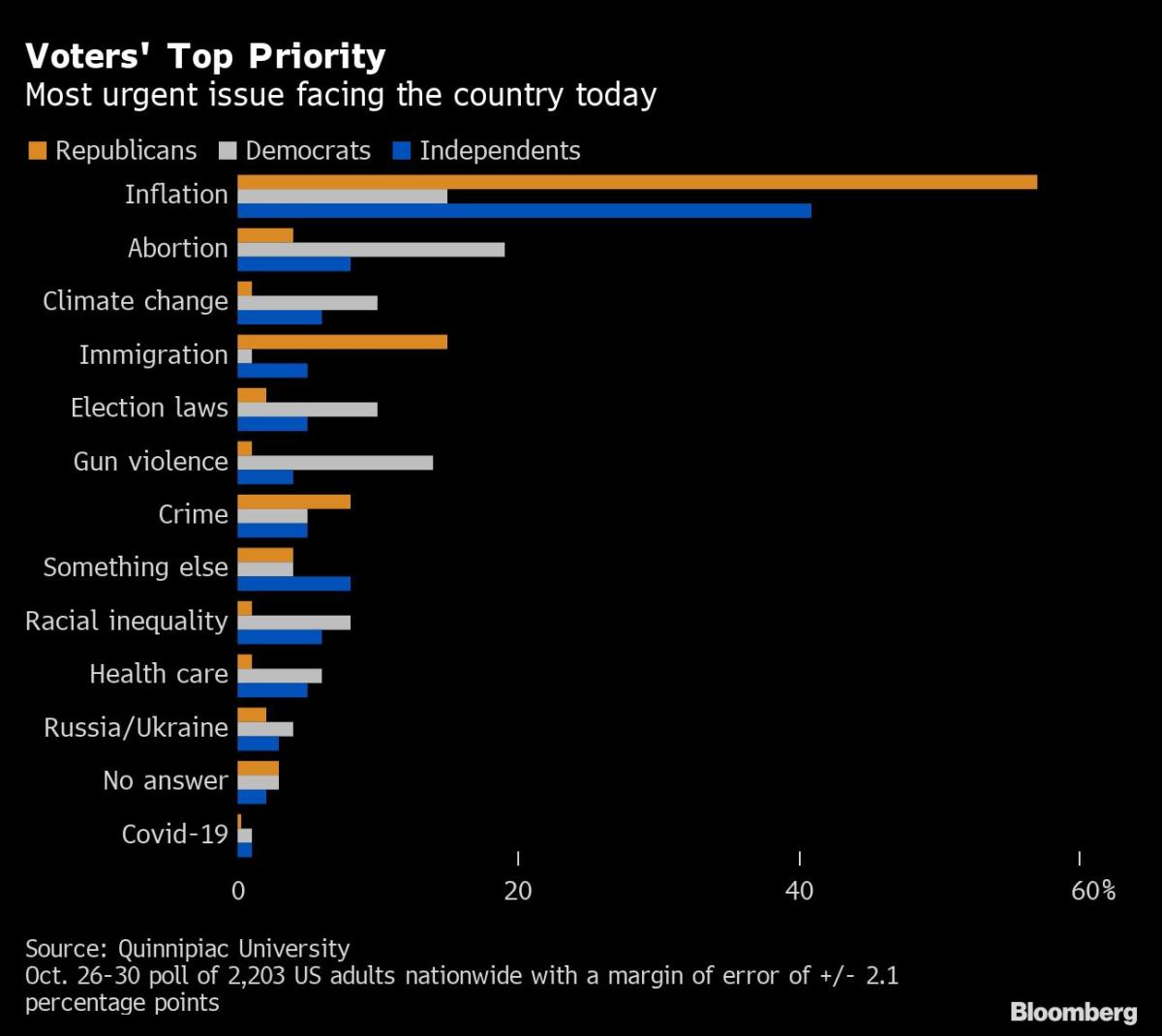
(Bloomberg) — US voters delivered a mixed verdict in elections shaped by inflation and splits around social issues, with Republicans headed toward control of the US House, but by smaller margins than forecast.
Most Read from Bloomberg
With polls closed across most of the US, some of the bellwether races that Republicans had hoped to snatch were held by Democrats. In one of their biggest wins of the night, John Fetterman narrowly defeated Republican television celebrity Mehmet Oz to claim a Senate seat in Pennsylvania.
House GOP leader Kevin McCarthy, who is in line to become speaker with a Republican majority, declared victory early Wednesday before the full results were known. And yet, GOP Senator Lindsey Graham acknowledged in an interview with NBC that the results were “definitely not a Republican wave.”
Or, as Fetterman put in his speech: “We jammed them up, we held the line.”
By early Wednesday, Republicans had won 199 House seats, compared to 172 for Democrats. At least 218 are needed to claim a majority. There were numerous races still to be decided, and some may be subject to court challenges.
President Joe Biden’s party was trying to buck history in Tuesday’s midterms by holding on to their razor-thin congressional majorities with the president’s legislative agenda hanging in the balance. Since World War II, the party holding the White House has, on average, lost 26 House seats and four Senate seats. Barack Obama’s Democrats lost 63 House seats in 2010 and Donald Trump’s Republicans 40 House seats in 2018.
Polls and independent forecasts for the midterms had fluctuated widely over the past several months as voters grappled with inflation near a 40-year high and digested a Supreme Court ruling that ended the nationwide right to abortion. Republicans focused on the economy while Democrats highlighted abortion rights.
Nancy Pelosi, the current House speaker, said Democratic candidates “are strongly outperforming expectations across the country.”
In one crucial Senate race, incumbent Democratic Senator Raphael Warnock led GOP candidate Herschel Walker in Georgia by several thousand votes. That contest may be ultimately decided in a runoff if neither candidate gets more than 50% of the vote.
In other closely watched contests, JD Vance defeated Democrat Tim Ryan to keep an Ohio Senate seat in Republican hands, while incumbent Arizona Democratic Senator Mark Kelly was leading Republican Blake Masters. Wisconsin Senator Ron Johnson, a Republican, was leading his Democratic challenger, Lieutenant Governor Mandela Barnes, with most of the votes counted.
All of the Republican candidates were backed by Trump, who has campaigned across the country and has suggested he will announce his third run for the White House next week.
A clear victory for the GOP came in Florida, which continued making the turn from swing state to Republican stronghold. GOP Governor Ron DeSantis, a potential contender for the party’s 2024 presidential nomination, and Senator Marco Rubio handily won re-election. GOP candidates expanded their representation in the House by winning three seats that had been held by Democrats as well as another created in redistricting.
Yet overall voters delivered mixed signals in House races.
In Michigan, Representative Elissa Slotkin beat Republican Tom Barrett. In Virginia, Democratic incumbents Abigail Spanberger and Jennifer Wexton both won re-election. But Representative Elaine Luria was projected to lose to GOP challenger Jen Kiggans. All four Democrats were elected in a 2018 wave and were targeted by Republicans. In Ohio, Cincinnati City Councilman Greg Landsman defeated Representative Steve Chabot, the last remaining member of the Republican Revolution that took control of the House in 1994.
There were sporadic reports of voting glitches, including isolated cyber attacks, though none caused major disruptions. Arizona Republicans seized on technical problems with ballot tabulation machines in the state’s largest county to make unsubstantiated claims about the validity of Tuesday’s elections, signaling a contentious aftermath for the 2022 midterms.
GOP majorities in one or both congressional chambers would end unified Democratic control in Washington and lead to intensified partisan battles and policy gridlock. The Biden administration would face an onslaught of investigations from subpoena-wielding Republican committee chairs in the House.
Yet a tiny House majority would make it difficult for McCarthy to govern his conference and would raise questions about his ability to get the 218 votes he needs to become speaker in January.
Kentucky Representative Thomas Massie, a frequent critic of his GOP leaders said a narrow majority is good for conservatives. “If you have a 218 majority, then everybody’s vote counts” he said at McCarthy’s delayed victory party.
Democrats’ hopes for tax increases on the wealthy and corporations would be dashed should Republicans take at least one chamber. Prospects diminish for antitrust legislation aimed at big tech companies or a windfall profits tax on oil companies. Government shutdowns and a standoff over a US debt default also grow more likely.
And Republican control of the Senate would give the party a veto over Biden’s nominations to fill top jobs at agencies and in the federal judiciary.
Democrats were already beginning to assess their losses.
“We have to plan for 2024 differently than what took place in 2022,” South Carolina Representative James Clyburn, the third-ranking House Democrat, told CBS. “Now does that mean bringing in new people? Does that mean reassigning roles? I don’t know. I just think that people ought to just be honest with their assessments.”
The outcome of the midterms, which for much of the summer and early fall seemed remarkably close, hinged on Americans’ frustration over the rising cost of living and worries about the slowing economy. Democrats all along faced an uphill battle given widespread public discontent — two-thirds of Americans think the country is on the wrong track — and voters’ historical tendency to punish the president’s party in midterm elections.
Democrats struggled to deliver a consistent message on the economy. At times, they promoted consumer cost savings on prescription drugs and health insurance from Biden’s Inflation Reduction Act, pounded away at oil company profiteering with threats of a windfall profits tax and seized on statements from some GOP leaders threatening to cut Social Security and Medicare benefits.
Biden closed the cycle with an address warning of the danger posed to democracy by a slew of Republican congressional candidates who deny the 2020 presidential election outcome and urged Americans to reject Trump’s “big lie” refusing to recognize the defeat. He drew a direct line from last year’s Capitol insurrection by Trump supporters to a hammer-wielding assailant’s attack just before the midterms on House Speaker Pelosi’s 82-year-old husband.
Meanwhile, Trump all but confirmed at an Ohio rally on Monday that he will be announcing a third White House bid Nov. 15 at his Mar-a-Lago estate.
–With assistance from Gregory Korte and Greg Giroux.
(Updates overall totals and with Slotkin winning in 14th paragraph)
Most Read from Bloomberg Businessweek
©2022 Bloomberg L.P.




